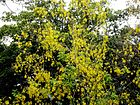Note: This is a project under development. The articles on this wiki are just being initiated and broadly incomplete. You can Help creating new pages.
Difference between revisions of "Cassia fistula - Aragvadha"
(→Photo Gallery) |
(→External Links) |
||
| Line 81: | Line 81: | ||
[[Category:Herbs]] | [[Category:Herbs]] | ||
| + | [[Category:Ayurvedic herbs that don't have flower, fruit and leaf photos]] | ||
| + | [[Category:Ayurvedic herbs that don't have seed photos]] | ||
Revision as of 09:27, 15 May 2019
Cassia fistula known as the golden rain tree, canafistula and by other names, is a flowering plant in the family Fabaceae. The species is native to the Indian subcontinent and adjacent regions of Southeast Asia. It ranges from southern Pakistan eastward throughout India to Myanmar and Thailand and south to Sri Lanka.
Contents
- 1 Uses
- 2 Parts Used
- 3 Chemical Composition
- 4 Common names
- 5 Properties
- 6 Habit
- 7 Identification
- 8 List of Ayurvedic medicine in which the herb is used
- 9 Where to get the saplings
- 10 Mode of Propagation
- 11 How to plant/cultivate
- 12 Commonly seen growing in areas
- 13 Photo Gallery
- 14 References
- 15 External Links
Uses
Fever, Skin diseases, Rheumatic diseases, Cervical lyrnphadenitis, Cardiac diseases, Worm Infestations, Abdominal pain.
Parts Used
Chemical Composition
Leaves contain anthraquinone derivatives, tannins, free rhein, rhein glycoside, Sennoside-A and Sennoside-B. They also contained kaempferol glycosides.[1]
Common names
| Language | Common name |
|---|---|
| Kannada | Aragvadha, Kakke, Kakke-gida, Kakkernara, Kakkedai, Rajataru |
| Hindi | Amaltas |
| Malayalam | Konna, Kritamalam |
| Tamil | Sarakonrai, Sarak konnai, Sarak kondi, Sharakkonrai |
| Telugu | Rela |
| Marathi | Bahava, Garamala, Amaltas |
| Gujarathi | Garamala, Garamalo |
| Punjabi | Amaltas |
| Kashmiri | Kriyangal Phali |
| Sanskrit | Krathamaala, Vyaadighata, Shampaaka |
| English | Indian Laburnum, Purging cassia |
Properties
Reference: Dravya - Substance, Rasa - Taste, Guna - Qualities, Veerya - Potency, Vipaka - Post-digesion effect, Karma - Pharmacological activity, Prabhava - Therepeutics.
Dravya
Rasa
Tikta (Bitter), Madhura (Sweet)
Guna
Guru
Veerya
Ushna (Hot)
Vipaka
Madhura (Sweet)
Karma
Recana
Prabhava
Habit
Identification
Leaf
| Kind | Shape | Feature |
|---|---|---|
| alternate | pinnate | 20 to 40 cm long pinnate, leaflets in 4 to 6 pairs, colour greenish, ovate with numerous nerves |
Flower
| Type | Size | Color and composition | Stamen | More information |
|---|---|---|---|---|
| Unisexual | 5 petals | bright yellowish | 10 stemens | Lax pendulous racemes flowering season February to April |
Fruit
| Type | Size | Mass | Appearance | Seeds | More information |
|---|---|---|---|---|---|
| cylindrical pod | 30 to 45cm long | brownish black in colour | flat, testa very hard, smooth, numerous, present between the pulp | {{{6}}} |
Other features
List of Ayurvedic medicine in which the herb is used
- Vishatinduka Taila as root juice extract
Where to get the saplings
Mode of Propagation
cuttings, layering, vegitative
How to plant/cultivate
Cassia fistula is widely grown as an ornamental plant in tropical and subtropical areas. It blooms in late spring[2]
Commonly seen growing in areas
Photo Gallery
References
External Links
- Ayurvedic Herbs known to be helpful to treat Fever
- Ayurvedic Herbs known to be helpful to treat Skin diseases
- Ayurvedic Herbs known to be helpful to treat Rheumatic diseases
- Ayurvedic Herbs known to be helpful to treat Cervical lyrnphadenitis
- Ayurvedic Herbs known to be helpful to treat Cardiac diseases
- Ayurvedic Herbs known to be helpful to treat Worm Infestations
- Ayurvedic Herbs known to be helpful to treat Abdominal pain
- Herbs with Fruit pulp used in medicine
- Herbs with Bark used in medicine
- Herbs with root used in medicine
- Herbs with common name in Kannada
- Herbs with common name in Hindi
- Herbs with common name in Malayalam
- Herbs with common name in Tamil
- Herbs with common name in Telugu
- Herbs with common name in Marathi
- Herbs with common name in Gujarathi
- Herbs with common name in Punjabi
- Herbs with common name in Kashmiri
- Herbs with common name in Sanskrit
- Herbs with common name in English
- Habit - Herb
- Index of Plants which can be propagated by cuttings
- Index of Plants which can be propagated by layering
- Index of Plants which can be propagated by vegitative
- Herbs that are commonly seen in the region of Tropical area
- Herbs
- Ayurvedic herbs that don't have flower, fruit and leaf photos
- Ayurvedic herbs that don't have seed photos



